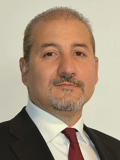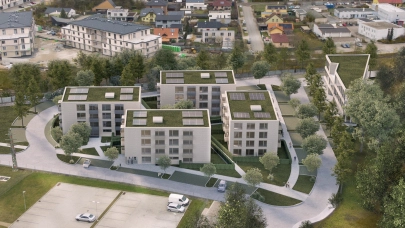
Radu Boitan, Investment Director at Revetas Capital Advisors talked to Property Forum about the importance of Environmental, Social, and Governance (ESG) initiatives, proactive asset management and investment strategies.
This interview was first published in Property Forum’s first annual “The 50 most influential people on Romania’s real estate market” publication.
How has the pandemic altered your investment strategy? What are you focusing more on these days?
A major strategic direction of the group is the deployment of ESG initiatives and establishing a roadmap to carbon neutrality over the coming period across the entire portfolio, with a special focus on diversity & equity as well as ensuring the accountability and progress tracking for all the ESG targets at all group levels. As a European real estate investment advisor, the integration of the environmental, social and governance principles into our group’s culture and across all investment processes during the entire holding cycle (from development/acquisition until disposal) is of utmost importance.
Revetas Group will complete its Fund III investment program during 2021 and carry out launching successful products for our investors. Revetas Capital Fund IV is a continuation of our persevering strategy of investing in high-quality real estate assets, located in capital and university cities across Central and Eastern Europe while adding diversification to the portfolio at a pan-European level. The Fund will focus on hospitality, logistics and opportunities with accelerating dynamics such as scalable residential projects, data centres, life science and tech-driven offices as well as mixed-use repositioning projects across the dominant markets within the region.

Radu Boitan
Investment Director
Revetas Capital
COVID-19 has increased the importance of not only health and safety but also sustainability in real estate. Is the same true for your operations as well?
The COVID-19 protection measures successfully implemented across the portfolio include comprehensive cleaning measures such as the deep cleaning of hand surfaces in common areas every 90 minutes, disinfecting the floors several times a day, intense digital communication and education initiatives, regular updates from the World Health Organization, extensive signage posted to educate tenants on how to prevent the spread of infection, training our staff for preventive measures communicated by the WHO, reviewing building maintenance activities to ensure critical functions continue to be met.
As a response to the requirements of the new reality, the Group has decided to act proactively and to roll out the Revetas EcoSystem concept across all the assets in our portfolio, with the purpose of not only complying with the health and safety measures but furthermore, to increase the productivity and wellbeing of all our tenants. Revetas translates this concept into design, technological and environmental solutions across its portfolio in order to activate the internal and external common areas of the projects, create flexible working spaces, redesigning parts of the buildings to better suit the needs of the employees, creating open-air gyms, additional green and recreational areas around the buildings where people can work, engage or simply relax. These measures can potentially reduce office density, offering versatile and innovative working solutions outside the cubicles, without renting additional office space, overall a superior office experience where you can integrate nature into daily work and contribute to the wellbeing of the employees. In Sofia Airport Center, Revetas Capital has implemented Flex-R Lounge, the first stage of the overall strategy for the renovation of the building and the activation of the common areas, a larger project that will generate a total of 150 new workstations.
This involves redesigning parts of the building internally and adding additional recreation areas around the lakeside, encouraging companies and their employees to expand outside their traditional working space into unconventional working units. In Bonarka For Business in Krakow, Revetas Capital is planning to upgrade the existing rainwater reservoir, to deliver a multifunctional/recreation area for all users, accessible composite terraces, event space, seats and footpaths around the pond, with a diverse wildlife and greenery component. Additional changes are envisioned, such as a multifunctional/ recreation area in front of existing buildings, with a playground zone, sports zone with outside sports facilities, expansion of the indoor gym area, natural elements for the existing plaza, such as a garden, green walls and roofs, city grassland, as well as a new pavilion with co-working, restaurant and coffee bar
The Millenium Garden project in Budapest was carefully designed by the FIABCI award-winning FINTA Studio, which took the requirements connected to the “Excellent” BREEAM qualification into account and opted for modern and environmentally friendly architectural solutions, and is planned for delivery in the second quarter of 2021.
The roof terraces, with a view over the Danube, along with features like the ground-floor garden, the neighbourhood’s cultural opportunities and the closeness of the green area, aim to increase employees’ wellbeing and will enable guests to enjoy after-work dinners and pre-theatre drinks as well as from workday lunches. The spacious garden located on the ground floor of Millennium Gardens will function as an alternative working environment and meeting point, featuring 300 seats. To support sustainable solutions, the building will be equipped with electric car charging stations and more than 200 bicycle parking spaces, and tenants will also be able to make use of environmentally friendly changing rooms with showers.
Radisson Blu Bucharest is set to undergo renovation and an extension. Are you taking the opportunity to upgrade other assets in your portfolio as well?
The Radisson Blu Complex is a key project for us and since the acquisition, we’ve designed an extended range of asset management initiatives aimed at further developing the project and increasing attractiveness while also providing a more institutional approach to all levels of the operations. In terms of development perspective, considering the high occupancy pre-COVID, we’ve decided to implement a different partitioning and a full refurbishment of two wings of the hotel that will add another 200 brand new units at Radisson Blu standards. The buildings will be delivered this year as shell & core and the fit-out part of the works will be finalized in a phased approach, prorated with the market ramp-up post-COVID. Also, as we wanted to further strengthen the position of this dominant scheme in the hospitality market, we have fully refurbished the key common areas, with a focus on the main lobby and internal courtyard that was always perceived as the focal attraction points of the property.
The new design language, together with the improved functionality and the two new, state-of-the-art bars complete a very competitive package that we are sure is going to attract a wider range of guests and keep the existing ones loyal. Last but not least, we have changed or fully upgraded all core MEP systems to ensure the highest efficiency and safety for our guests. From fire detection systems to boilers, air handlers and chillers, they were all changed and upgraded with modern, efficient and greener equipment that will form the backbone of the project for many years to come. In our Vitantis Shopping Center, we are currently implementing substantial improvements in the overall accessibility, parking system and amenities, strongly focusing on creating a superior shopping experience for customers while working in close alignment with the mix of retail partners present within the property and supporting the successful opening and further expansion of the “La Cocos“ hyperstore.
You put the Landmark office building in Bucharest up for sale shortly before the pandemic started. What are your current plans for the asset?
Indeed, the resilience and a strong mix of qualities of an asset such as Landmark is only proven during challenging times. Landmark is a prime office complex with regional relevance due to its unique business park configuration and exceptional CBD location, offering institutional-grade specifications, a diversity of outdoor and indoor retail amenities and socializing areas, flexible floor plates as well as an excellent parking provision. In strict alignment with our tenants’ wellbeing, we performed and completed a highly focused investment program for Landmark, its core being the redesign of all internal and external common areas and increased connectivity, creating an attractive and highly interactive environment for all its occupiers and the surrounding community. The asset is hosting a mix of established international and regional tenants, leading corporates from well-diversified economic sectors which despite the challenges of the pandemic decided to expand and consolidate their presence further in the property in recognition of its qualities and ultimately increasing its institutional profile. In light of the above, we are delighted to notice that Landmark’s liquidity and overall attractiveness remained intact and even increased post-pandemic within the current low interest rate environment and continue to closely follow the positive evolution of Bucharest’s real estate market.
Which asset class(es) do you expect to have increased in attractiveness the most by the time the pandemic is over?
It is undoubtable that the logistics and industrial asset class is the winner of the current phase of the economic cycle backed by the strongly accelerated growth of the e-commerce sector and reshoring intentions within the manufacturing chain. The rapid demand escalation and increased liquidity on the background of a rather scarce offer of prime products is visible across the region with inherent acquisition risks building up due to a massive increase in the supply of secondary and tertiary quality products as well as developers’ “greenfield” speculative activity. As part of our investment strategy for the next five years, we have a solid interest in rapidly expanding our logistic portfolio through a mix of corporate partnerships and execution of a solid pipeline of quality development projects across the CEE region. Of course, our focus remains on assets’ fundamentals in terms of each specific location, accessibility and mix of services, covenant strength, specific concept, technical quality and institutional specifications, and of course the value-add opportunities with the ultimate goal of properly determining the long term income profile and reletting outlook of the asset. Residential is the next asset class clearly benefiting from the high market liquidity and low interest environment combined with inflationary fears. The solid growth visible in the residential sector has in fact always been present in our investment thesis supported by our strong belief in CEE university cities - subjects of rapid urbanisation and young professionals’ mobility in the region - ultimately acting as epicentres of growth for their economies. We remain interested in medium and large scale multi-phased residential developments, potentially part of larger mix-use projects, across all important university cities in CEE, with the capacity to create real communities and deliver long term benefits for all our stakeholders.



